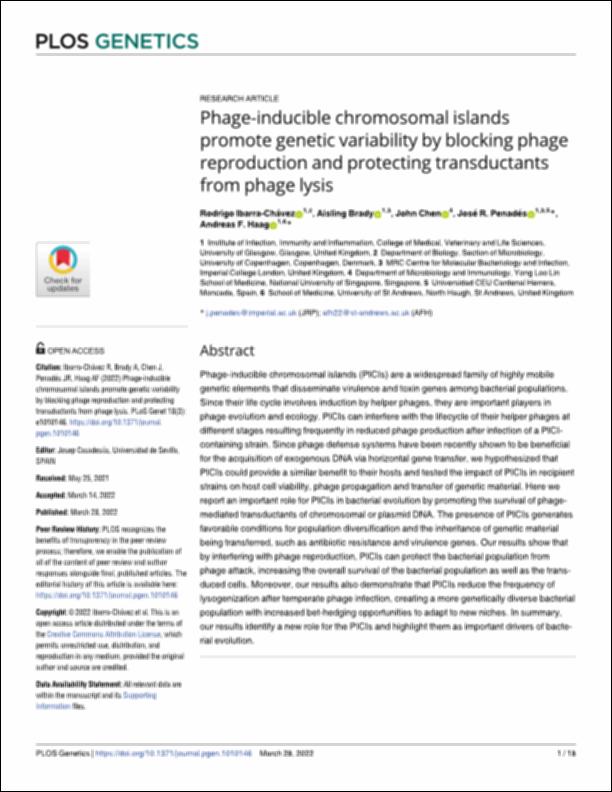Por favor, use este identificador para citar o enlazar este ítem:
http://hdl.handle.net/10637/14428Phage-inducible chromosomal islands promote genetic variability by blocking phage reproduction and protecting transductants from phage lysis
| Título : | Phage-inducible chromosomal islands promote genetic variability by blocking phage reproduction and protecting transductants from phage lysis |
| Autor : | Ibarra Chávez, Rodrigo Brady, Aisling Chen, John Penadés Casanova, José Rafael Haag, Andreas F. |
| Materias: | Genómica.; Genomics.; Biología molecular.; Molecular biology.; Molecular genetics.; Staphylococcus.; Ácidos nucleicos.; Nucleic acid.; Genética molecular.; Estafilococos. |
| Editorial : | PLOS |
| Citación : | Ibarra-Chávez, R., Brady, A., Chen, J., Penadés, J. R. & Haag, A. F. (2022). Phage-inducible chromosomal islands promote genetic variability by blocking phage reproduction and protecting transductants from phage lysis. PLoS Genetics, vol. 18, i. 3 (28 mar.), art. e1010146. DOI: https://doi.org/10.1371/journal.pgen.1010146 |
| Resumen : | Phage-inducible chromosomal islands (PICIs) are a widespread family of highly mobile genetic elements that disseminate virulence and toxin genes among bacterial populations. Since their life cycle involves induction by helper phages, they are important players in phage evolution and ecology. PICIs can interfere with the lifecycle of their helper phages at different stages resulting frequently in reduced phage production after infection of a PICIcontaining strain. Since phage defense systems have been recently shown to be beneficial for the acquisition of exogenous DNA via horizontal gene transfer, we hypothesized that PICIs could provide a similar benefit to their hosts and tested the impact of PICIs in recipient strains on host cell viability, phage propagation and transfer of genetic material. Here we report an important role for PICIs in bacterial evolution by promoting the survival of phagemediated transductants of chromosomal or plasmid DNA. The presence of PICIs generates favorable conditions for population diversification and the inheritance of genetic material being transferred, such as antibiotic resistance and virulence genes. Our results show that by interfering with phage reproduction, PICIs can protect the bacterial population from phage attack, increasing the overall survival of the bacterial population as well as the transduced cells. Moreover, our results also demonstrate that PICIs reduce the frequency of lysogenization after temperate phage infection, creating a more genetically diverse bacterial population with increased bet-hedging opportunities to adapt to new niches. In summary, our results identify a new role for the PICIs and highlight them as important drivers of bacterial evolution. |
| Descripción : | Este artículo se encuentra disponible en la siguiente URL: https://journals.plos.org/plosgenetics/article?id=10.1371/journal.pgen.1010146 |
| URI : | http://hdl.handle.net/10637/14428 |
| Derechos: | http://creativecommons.org/licenses/by/4.0/deed.es |
| ISSN : | 1553-7390 1553-7404 (Electrónico) |
| Idioma: | es |
| Fecha de publicación : | 28-mar-2022 |
| Centro : | Universidad Cardenal Herrera-CEU |
| Aparece en las colecciones: | Dpto. Ciencias Biomédicas |
Los ítems de DSpace están protegidos por copyright, con todos los derechos reservados, a menos que se indique lo contrario.


